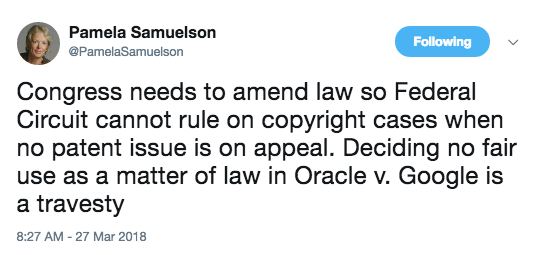Skilled in the Art: Groundhog Day for Google at Federal Circuit
Will there be a third trial in Oracle v. Google? Or a Supreme Court showdown? And what's the Federal Circuit doing in the middle of a copyright case, anyway?
March 27, 2018 at 07:00 PM
8 minute read
Welcome to Skilled in the Art. I'm Law.com IP reporter Scott Graham. At 6 a.m. my alarm clock went off playing I Got You Babe and moments later Judge O'Malley was reversing another Oracle v. Google judgment. I've got some thoughts on this ruling below, plus a rundown of some of the hotshots who'll be arguing cases to the Federal Circuit next week. As always feel welcome to email me your thoughts, or find me on Twitter.
Would you like to receive Skilled in the Art as an email. Sign up here and receive the next issue straight to your inbox.
This Just In: Judge O'Malley Doesn't Like Google's Case
It's been almost eight years since Oracle sued Google over the Java APIs. We've had all-star lawyer lineups, a trial judge who codes, testimony from Silicon Valley heavyweights, two jury verdicts and now the Federal Circuit throwing out both of those verdicts.
Today, Federal Circuit Judge Kathleen O'Malley ruled that when copying is verbatim, a mere change in format from desktop to smartphone “is insufficient as a matter of law to qualify as a transformative fair use.” That knocked the legs out from under Google's case.
It's fair to say the ruling had its supporters …
… and its detractors.
I thought I'd poll all of you on what's likely to happen next. Will …
A) The Federal Circuit take the case en banc and admonish the panel for failing to respect the limited nature of the appellate function?
B) The Supreme Court take up the case and completely rewrite the law of fair use, putting the case back to square one?
C) Judge William Alsup grudgingly proceed with a damages trial ending in a $750 million award, only to have Judge O'Malley send it back a third time because the amount is unreasonably low?
Email me your vote. My pick, of course, would be D) All of the above.
Seriously, could this case get the Supreme Court justices' attention? Haynes and Boone partner Jason Bloom told me for my story earlier today that while there's no apparent circuit split, “given the magnitude of this case and what it means for software developers, they might want to weigh in.”
O'Malley herself questioned whether fair use, an affirmative defense that's equitable in nature, should ever be put to a jury. “The Supreme Court has never clarified whether and to what extent the jury is to play a role in the fair use analysis,” she wrote, noting that its 1985 landmark Harper & Row Publishers v. Nation Enterprises was an appeal from a bench trial.
Might that be enough to hang a cert petition on?
We'll see. In the meantime, I think it's worth noting that Google did prevail on one hotly contested point. Moments before issuing its ruling Tuesday morning, the Federal Circuit granted Google's motion to modify the caption from Google Inc. to Google LLC
Olivia de Havilland and the Luck of the Draw
Yesterday I reported on a California Court of Appeal decision that rejected publicity right and false light claims brought by Olivia de Havilland against FX Networks. De Havilland complained that FX's Emmy-winning docudrama Feud falsely portrayed her as referring to “my bitch sister” and joking about Frank Sinatra's appetite for alcohol. De Havilland had defeated an anti-SLAPP motion in the trial court but a Second District panel led by Justice Anne Egerton reversed on First Amendment grounds. Even a living legend like De Havilland does not have the right to “control, dictate, approve, disapprove, or veto the creator's portrayal of actual people,” Egerton wrote.
A sharp-eyed reader points out to me that Egerton appears to have been an unlucky draw for the 101-year-old actor. Not only did Egerton once practice at FX counsel Munger, Tolles & Olson—albeit 28 years ago—she also was NBC's West Coast general counsel for 10 years before becoming a judge in 2001.
Who's Arguing?
Next week is a calendar week at the Federal Circuit. Here are a few of the cases on my radar screen:
➤ Power Integrations v. Fairchild Semiconductor. This is a major piece of a wide-ranging, big-dollar dispute between two competitors. Power Integrations won a $105 million verdict against Fairchild for infringing two patents on energy-saving power converters for electronic devices. After the Federal Circuit changed damages law in VirnetX, Fairchild obtained a new damages trial before U.S. District Judge Maxine Chesney, but Power Integrations won even more: $147 million. Fairchild has brought in Quinn Emanuel Urquhart & Sullivan for the appeal, with Kathleen Sullivan to argue April 2. Fish & Richardson partner Frank Scherkenbach, who's been litigating claims between the two companies since 2004, will argue for Power Integrations.
➤ Finisar v. Nistica. The latest trial—or more precisely, two trials—bubbling up from U.S. District Judge Beth Labson Freeman's patent-heavy San Jose courtroom. This is an optical networking case that turns on whether “focusing” spatially separated wavelength signals requires convergence in one or two dimensions. The first jury hung after requesting clarification. Following a new construction the second jury returned a defense verdict. David Radulescu of Radulescu LLP will argue Finisar's appeal on April 4. Dentons partner Robert Kramer will defend his trial judgment.
➤ Smartflash v. Apple, Samsung, Google. Aaron Panner must be psychic. The Kellogg, Hansen, Todd, Figel & Frederick partner knows he has an uphill battle because of a previous Federal Circuit ruling finding related Smartflash patent claims ineligible. But, he wrote in his brief last summer, “by the time this appeal is decided, there may be additional developments in the law interpreting Section 101 that would warrant a fresh look at the issue presented.” In February his prediction came true, when the Federal Circuit ruled in Berkheimer v. HP that patent eligibility involves fact issues that can't always be resolved before trial. Panner will square off with Gibson, Dunn & Crutcher partner Mark Perry, who says there are no disputed questions on eligibility, on April 5. PTO Associate Solicitor William LaMarca will also defend the series of CBMs decided against Smartflash.
➤➤ Are you enjoying Skilled in the Art? Click here to check out more new briefings from Law.com writers.
Me Olvide de Pagar
Did he forget how to live or did he forget how to pay his collaborators? I love the way my ALM colleague Samantha Joseph frames this copyright complaint against Julio Iglesias over “Me Olvide de Vivir.”
Another Win for Unified
Unified Patents keeps making life difficult for some of the country's biggest NPEs. On Monday the Patent Trial and Appeal Board found unpatentable five challenged claims of an Intellectual Ventures patent on improved methods for managing cached data.
There are some storm clouds brewing at the Federal Circuit over the model under which organizations like Unified and RPX Corp. bring IPRs that benefit their member companies. But for now Unified is on a tear, filing the fourth-most IPRs in 2017 and knocking out patent claims held by Dominion Harbor, Sportbrain Holdings and now IV in the last two months.
Unified's Roshan Suresh Mansinghani and Jonathan Stroud teamed up with Finnegan, Henderson, Farabow, Garrett & Dunner partner Lionel Lavenue and associate James Stein on Unified Patents v. Intellectual Ventures.
That's all the dictating of history I'm going to do today. Tune in Friday for more Skilled in the Art.
This content has been archived. It is available through our partners, LexisNexis® and Bloomberg Law.
To view this content, please continue to their sites.
Not a Lexis Subscriber?
Subscribe Now
Not a Bloomberg Law Subscriber?
Subscribe Now
NOT FOR REPRINT
© 2025 ALM Global, LLC, All Rights Reserved. Request academic re-use from www.copyright.com. All other uses, submit a request to [email protected]. For more information visit Asset & Logo Licensing.
You Might Like
View All
Global Lawyer: Big Law Walks a Tightrope But Herbert Smith Freehills Refuses to Lose Its Footing
8 minute readTrending Stories
- 1'A Death Sentence for TikTok'?: Litigators and Experts Weigh Impact of Potential Ban on Creators and Data Privacy
- 2Bribery Case Against Former Lt. Gov. Brian Benjamin Is Dropped
- 3‘Extremely Disturbing’: AI Firms Face Class Action by ‘Taskers’ Exposed to Traumatic Content
- 4State Appeals Court Revives BraunHagey Lawsuit Alleging $4.2M Unlawful Wire to China
- 5Invoking Trump, AG Bonta Reminds Lawyers of Duties to Noncitizens in Plea Dealing
Who Got The Work
J. Brugh Lower of Gibbons has entered an appearance for industrial equipment supplier Devco Corporation in a pending trademark infringement lawsuit. The suit, accusing the defendant of selling knock-off Graco products, was filed Dec. 18 in New Jersey District Court by Rivkin Radler on behalf of Graco Inc. and Graco Minnesota. The case, assigned to U.S. District Judge Zahid N. Quraishi, is 3:24-cv-11294, Graco Inc. et al v. Devco Corporation.
Who Got The Work
Rebecca Maller-Stein and Kent A. Yalowitz of Arnold & Porter Kaye Scholer have entered their appearances for Hanaco Venture Capital and its executives, Lior Prosor and David Frankel, in a pending securities lawsuit. The action, filed on Dec. 24 in New York Southern District Court by Zell, Aron & Co. on behalf of Goldeneye Advisors, accuses the defendants of negligently and fraudulently managing the plaintiff's $1 million investment. The case, assigned to U.S. District Judge Vernon S. Broderick, is 1:24-cv-09918, Goldeneye Advisors, LLC v. Hanaco Venture Capital, Ltd. et al.
Who Got The Work
Attorneys from A&O Shearman has stepped in as defense counsel for Toronto-Dominion Bank and other defendants in a pending securities class action. The suit, filed Dec. 11 in New York Southern District Court by Bleichmar Fonti & Auld, accuses the defendants of concealing the bank's 'pervasive' deficiencies in regards to its compliance with the Bank Secrecy Act and the quality of its anti-money laundering controls. The case, assigned to U.S. District Judge Arun Subramanian, is 1:24-cv-09445, Gonzalez v. The Toronto-Dominion Bank et al.
Who Got The Work
Crown Castle International, a Pennsylvania company providing shared communications infrastructure, has turned to Luke D. Wolf of Gordon Rees Scully Mansukhani to fend off a pending breach-of-contract lawsuit. The court action, filed Nov. 25 in Michigan Eastern District Court by Hooper Hathaway PC on behalf of The Town Residences LLC, accuses Crown Castle of failing to transfer approximately $30,000 in utility payments from T-Mobile in breach of a roof-top lease and assignment agreement. The case, assigned to U.S. District Judge Susan K. Declercq, is 2:24-cv-13131, The Town Residences LLC v. T-Mobile US, Inc. et al.
Who Got The Work
Wilfred P. Coronato and Daniel M. Schwartz of McCarter & English have stepped in as defense counsel to Electrolux Home Products Inc. in a pending product liability lawsuit. The court action, filed Nov. 26 in New York Eastern District Court by Poulos Lopiccolo PC and Nagel Rice LLP on behalf of David Stern, alleges that the defendant's refrigerators’ drawers and shelving repeatedly break and fall apart within months after purchase. The case, assigned to U.S. District Judge Joan M. Azrack, is 2:24-cv-08204, Stern v. Electrolux Home Products, Inc.
Featured Firms
Law Offices of Gary Martin Hays & Associates, P.C.
(470) 294-1674
Law Offices of Mark E. Salomone
(857) 444-6468
Smith & Hassler
(713) 739-1250














